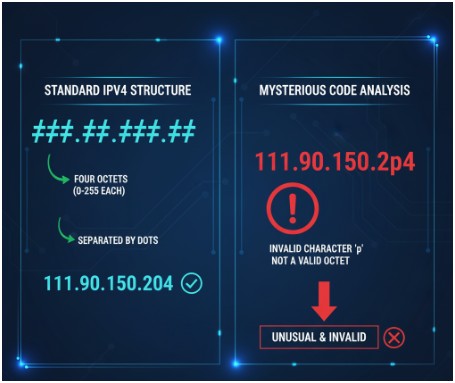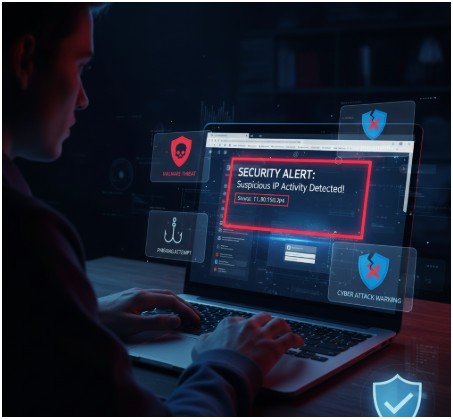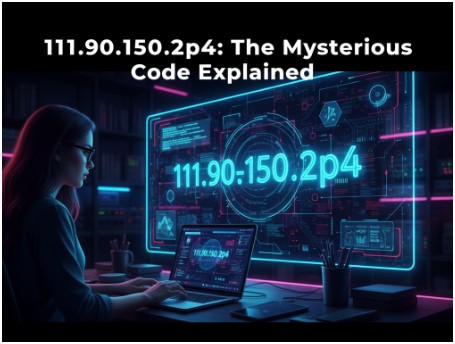I’ll be honest with you—I never expected 111.90.150.2p4 to eat up an entire Saturday afternoon. It all started with a random message from a friend asking if I’d ever heard of that strange sequence. At first glance, I assumed it was just another IP address.
But then I noticed something odd—“2p4” isn’t a valid part of any IPv4 address. That tiny detail triggered my curiosity, and before I knew it, I was deep into a web of tech talk, suspicious websites, and even a so-called “customer service hotline.”
If you’ve ever stumbled upon 111.90.150.2p4 online and wondered whether it’s safe, shady, or just misunderstood, you’re not alone. My journey to figure it out revealed a mix of truth, speculation, and plenty of reasons to stay cautious.
What Exactly Is 111.90.150.2p4 and Why Does It Look So Weird?

The first thing I noticed about 111.90.150.2p4 is that it doesn’t follow the standard IPv4 format. Traditional IPv4 addresses have four numbers (called octets) separated by periods, and each one ranges from 0 to 255. Something like 111.90.150.204 would be valid. But that little “2p4” at the end? That breaks the rules.
Some blogs online suggest that “2p4” might be shorthand or a stylized version of .204—essentially pointing toward the real IP address: 111.90.150.204. Once I followed that trail, things started making more sense.
That IP is linked to Shinjiru Technology Sdn Bhd, a web hosting provider based in Kuala Lumpur, Malaysia. It’s part of the range 111.90.128.0 – 111.90.159.255, which Shinjiru manages.
Here’s where things get intriguing: this IP range has appeared in reports linked to “bokeh” video content—basically viral or adult-oriented videos popular in some parts of Asia. That’s not inherently bad, but it does mean you should tread carefully.
Content like that can sometimes attract shady sites, malware risks, or questionable legal territory depending on where you live.
Why Are Websites Talking About Customer Support for 111.90.150.2p4?

While digging deeper, I stumbled on a series of websites claiming to offer “customer support” for 111.90.150.2p4. They listed hotline numbers, support emails, and even live chat options. One number that popped up everywhere was 111.90.159132, and another was 8055902250 for business inquiries.
At first, I thought, “Who sets up customer support for an IP address?” That’s like setting up a help desk for a street address—it’s unusual. The more I read, the more it looked like these “support services” were either placeholders or part of a marketing scheme rather than official technical support.
The tone across those sites felt suspiciously similar, too—lots of generic talk about “enhancing user experience” and “ensuring satisfaction” but little actual proof of a legitimate service.
That doesn’t mean the numbers are outright scams, but I’d be skeptical about calling them or sharing any personal information unless I knew exactly who was behind them.
Could 111.90.150.2p4 Be Dangerous?
Here’s the part where my cybersecurity instincts kicked in. Anytime something looks slightly off—like a malformed IP address—you should assume there might be risk involved.
In the case of 111.90.150.2p4, there are a few red flags:
- It’s linked to a hosting provider known for offshore services, which sometimes host controversial or unregulated content.
- Some reports associate that IP range with suspicious or malicious URLs. Clicking on those links could expose you to malware, phishing, or data theft.
- The presence of repeated, unverified “customer service” numbers hints that this might be part of a broader scheme to collect data or mislead users.
I’m not saying you’ll definitely run into trouble with 111.90.150.2p4, but I treat anything linked to it with caution—especially if it’s promising free content, quick money, or requires you to hand over personal details.
How Do You Stay Safe Around 111.90.150.2p4?
If you come across 111.90.150.2p4 while browsing, here’s how I handle it:
- Verify before you click.
Run the IP through a WHOIS lookup or IP reputation checker first. This helps confirm whether it’s tied to a legitimate service or flagged for malicious activity. - Avoid sharing personal data.
If a site connected to that IP asks for sensitive details—like your name, email, or credit card—walk away. Real services don’t usually request that kind of info upfront. - Use trusted security tools.
A good antivirus and a reliable browser extension that blocks phishing attempts can save you from accidentally landing on a harmful page. - Don’t rely on shady “customer support.”
Those hotline numbers you see online? I’d think twice before calling. Without verified ownership, they’re more risk than help.
I learned the hard way that curiosity can lead you down some risky paths. Now, I always pause and check the basics before engaging with anything unfamiliar—especially when strange IPs like 111.90.150.2p4 pop up.
Why Do People Care About 111.90.150.2p4 at All?
It’s a fair question. Why does something that looks like a typo draw so much attention online? The answer lies in how the internet works. IP addresses are like digital street signs—they tell your device where to go. When one of those “addresses” doesn’t follow the usual rules, people notice.
Plus, anything connected to Shinjiru Technology tends to spark curiosity. The company has hosted a mix of regular websites and more controversial content over the years, so tech enthusiasts and cybersecurity folks like me often keep an eye on their IP ranges.
And then there’s the “bokeh” factor. Sites linked to 111.90.150.2p4 often mention viral videos or adult content, which naturally draws clicks—and scams love high-traffic topics.
FAQs About 111.90.150.2p4
Q1: Is 111.90.150.2p4 a real IP address?
Not exactly. The correct format would be 111.90.150.204. The “2p4” part doesn’t follow IPv4 standards. Some people use it informally to reference .204, but it’s technically incorrect.
Q2: Is it safe to visit websites linked to 111.90.150.2p4?
Proceed with caution. Some may be harmless, but others could host malware or phishing scams. Always verify the site’s reputation and avoid giving out personal information.
Q3: Who owns 111.90.150.204?
The IP belongs to Shinjiru Technology Sdn Bhd, a hosting provider based in Malaysia. They manage a range of IPs from 111.90.128.0 to 111.90.159.255.
Q4: What should I do if I get contacted by “customer support” for 111.90.150.2p4?
Be careful. There’s no verified customer support for an IP address. Don’t share personal details or payment information. If the contact seems suspicious, block the number and report it.
Final Thoughts: Curiosity Is Fun, but Caution Is Smarter
Digging into 111.90.150.2p4 taught me a valuable lesson: not everything online is what it seems. What started as a curious string of numbers led me into a world of questionable sites, mystery hotlines, and potential risks. And while it’s tempting to click and explore, a little skepticism goes a long way in keeping you safe.
My advice? Treat unfamiliar IP addresses like unknown callers—don’t answer without checking who’s behind them. Whether it’s 111.90.150.2p4 or any other suspicious-looking code, staying alert is the smartest move you can make in the digital world.

